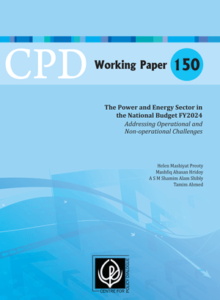 The power and energy sector of Bangladesh has been confronting several challenges that adversely affected various economic activities in households, agriculture, industries and businesses. These power and energy sector challenges require special attention from the National Budget FY23–24. However, the national budget for FY23–24 was a ‘business as usual’ budget for this sector instead of addressing significant challenges. So, the expectations are lower that the budget passed at the parliament would improve the sectoral health in particular. The study analysis shows that the power and energy sector has no good news in the early future, and load shedding is likely to continue in the coming months, hindering households, businesses, industry, and commercial activities. With huge excess reserves (about 50 per cent in FY25), the power sector will continue struggling to meet the capacity payment, subsidy requirements and fuel import payments. The mechanism of subsidy rationalisation under the IMF conditionality is found to be inefficient as it promotes passing the burden to the consumers’ solely instead of ending subsidy through gradual phase-out of capacity payment. The study suggests further emphasis should be given to domestic gas exploration instead of the LNG-based power generation. Supportive fiscal measures must be promoted to encourage domestic and foreign investment in the development of renewable energy and strengthen the institutional capacity of the SREDA.
The power and energy sector of Bangladesh has been confronting several challenges that adversely affected various economic activities in households, agriculture, industries and businesses. These power and energy sector challenges require special attention from the National Budget FY23–24. However, the national budget for FY23–24 was a ‘business as usual’ budget for this sector instead of addressing significant challenges. So, the expectations are lower that the budget passed at the parliament would improve the sectoral health in particular. The study analysis shows that the power and energy sector has no good news in the early future, and load shedding is likely to continue in the coming months, hindering households, businesses, industry, and commercial activities. With huge excess reserves (about 50 per cent in FY25), the power sector will continue struggling to meet the capacity payment, subsidy requirements and fuel import payments. The mechanism of subsidy rationalisation under the IMF conditionality is found to be inefficient as it promotes passing the burden to the consumers’ solely instead of ending subsidy through gradual phase-out of capacity payment. The study suggests further emphasis should be given to domestic gas exploration instead of the LNG-based power generation. Supportive fiscal measures must be promoted to encourage domestic and foreign investment in the development of renewable energy and strengthen the institutional capacity of the SREDA.
Authors: Helen Mashiyat Preoty, Mashfiq Ahasan Hridoy, ASM Shamim Alam Shibly and Tamim Ahmed
Publication Period: July 2023



